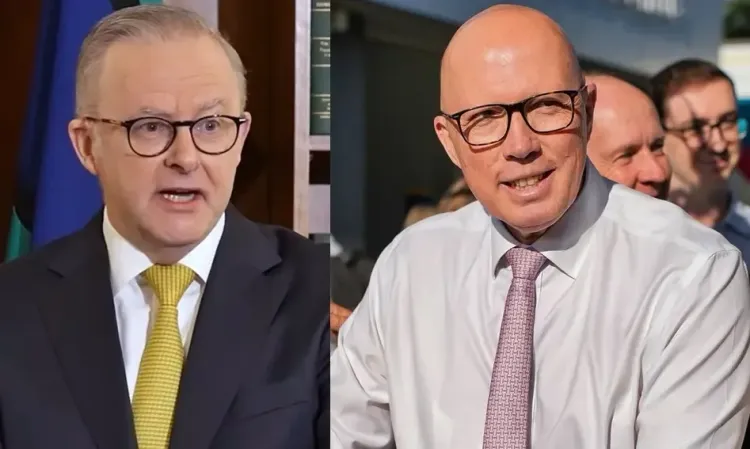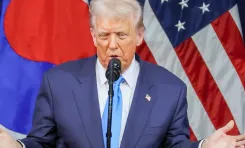Support for Australian Opposition Declines Due to Trump Presidency: New Polls

Synopsis
Key Takeaways
- Australians' views on Trump are affecting Dutton's support.
- Labor leads the Coalition in multiple recent polls.
- 33% of voters are less likely to support Dutton due to Trump.
- 68% believe Trump's victory would be bad for Australia.
- Labor is expected to increase its majority in the House of Representatives.
Canberra, April 15 (NationPress) The perception of US President Donald Trump among Australians is contributing to a decline in backing for opposition leader Peter Dutton as the country approaches its general election, according to recent polling.
Multiple significant opinion polls released in the past few days indicate that voter support for current Prime Minister Anthony Albanese and his governing Labor Party continues to rise as the campaign for the May 3 election reaches its midpoint.
One poll conducted by research firm Resolve Strategic and published by Nine Entertainment newspapers on Monday night suggested that Labor holds a lead over Dutton's Coalition with a margin of 53.5-46.5 percent in two-party terms. This is a shift from late March when both major parties were tied at 50-50.
When asked how their opinion of Trump would affect their upcoming vote, 33 percent of respondents indicated that it has made them less inclined to support Dutton and the Coalition, while 14 percent felt more likely to do so, and 53 percent remained undecided or felt it would have no impact.
In contrast, 22 percent of respondents stated that their view of Trump has made them more inclined to vote for Albanese and Labor, whereas 21 percent felt less likely to do so, according to reports from Xinhua news agency.
Among those who are still undecided, 35 percent said their opinion of Trump has made them less likely to vote for Dutton and the Coalition, compared to 24 percent who said the same regarding Albanese and Labor.
The survey revealed that 68 percent of voters now believe that Trump's potential victory in the 2024 US election would be detrimental for Australia, rising from 60 percent in March and 40 percent in November.
"Trump equals uncertainty, and that is significantly impacting Dutton's ability to persuade voters to take a chance on a government change," stated Resolve Director Jim Reed.
The Labor Party has consistently drawn parallels between Dutton and Trump. Earlier in April, Dutton retracted the Coalition's election promise to eliminate 41,000 public service jobs and terminate flexible work arrangements for federal workers—a policy that senior Labor officials labeled as "Trumpian".
Coalition Senator Jacinta Nampijinpa Price, whom Dutton appointed as shadow minister for government efficiency in January, stated at a press conference in Western Australia that a Coalition government would "make Australia great again".
While formally launching Labor's election campaign in WA on Sunday, Albanese asserted that Australia is a "great country" that does not need to "borrow slogans" or ideas.
A second poll released on Monday by market research firm Roy Morgan indicated that Labor leads the Coalition 54.5-45.5 percent based on two-party preferences.
In the 2022 election, Labor secured victory with a margin of 52.13-47.87 on a two-party basis. The Roy Morgan poll suggests that Labor is poised to expand its majority in the 150-seat House of Representatives, where the government is formed.
Currently, Labor controls 77 seats in the lower house compared to the Coalition's 53 seats.
Michele Levine, Chief Executive of Roy Morgan, noted that Trump's global tariffs have caused significant market disruption, leading voters to typically favor incumbent governments during periods of uncertainty.
Two additional polls, one published by News Corp Australia newspapers on Sunday and another by The Guardian Australia on Tuesday, also indicated that Labor is likely to win the upcoming election.
The News Corp poll reported that Labor leads the Coalition 52-48, while The Guardian's poll, which allows respondents to remain uncommitted, showed Labor ahead 50-45.
Albanese and Dutton will face off in the second leaders' debate on Wednesday night, following Albanese being declared the winner of their first debate on April 8.








